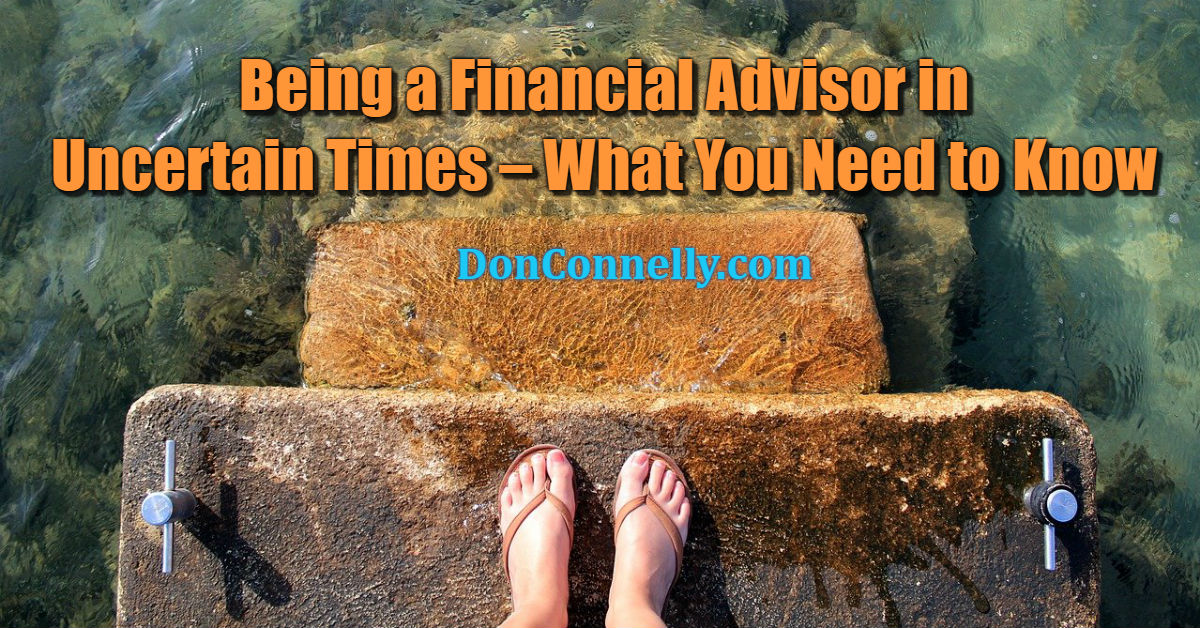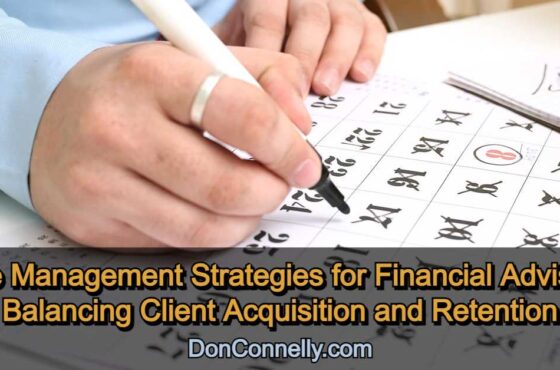Being a Financial Advisor in Uncertain Times – What You Need to Know
 As I write this in mid-October, 2020, the stock market is sitting right at an all-time high. But there’s still an ongoing pandemic – and a presidential election looming. Either of these things can cause big short-term swings in stock prices.
As I write this in mid-October, 2020, the stock market is sitting right at an all-time high. But there’s still an ongoing pandemic – and a presidential election looming. Either of these things can cause big short-term swings in stock prices.
That means things are pretty risky at the moment. In the short-term, anyway.
As financial advisors, we have to help our clients understand that risk, and help them manage their money so they can accomplish their financial goals, but also so they can sleep at night in the meantime.
Those of you who have been around since before 2008 know this process well. For those of you who are just getting started, here’s what you need to know.
#1. You’ve got to care for yourself.
Before you can tell your clients to hold steady in the face of a crazy market, you’ve got to be holding steady yourself. That’s not an easy thing for a lot of advisors to do. We’re not robots. We’re not immune from human emotions ourselves.
In 2012, a report published in the Journal of Financial Therapy found that the 2008-2012 crisis was actually psychologically damaging to a lot of advisors. Many were “shaken to the core by the loss of client confidence and self-confidence.”
Earlier studies conducted during the worst of the 2008 mortgage crisis found that 90% of advisors experienced elevated stress levels. 30% said their stress levels were causing them to have trouble sleeping. And 60% of them were “rethinking how they were managing investment risk and asset allocation for clients.”
If that rethinking caused clients to sell good assets into the middle of a savage bear market, they probably didn’t do much good for them, long-term.
Those who took their clients’ criticisms personally were most affected – though since we care very much for our clients, it’s very hard not to.
The Kansas State University researchers found that the elevated stress levels and cognitive dissonance produced by the perceived need to abandon tried and proven long-term risk controls and sound investment thinking caused symptoms that were so severe they paralleled post-traumatic stress symptoms experienced by combat veterans.
To minimize the effects of stress, take care of yourself.
- Eat healthy.
- Exercise.
- Clear your mind.
- Be especially careful to reduce alcohol and tobacco consumption during this time. You’ll need every edge.
- Stay grounded. Read the works of the investing greats. They’ve seen all the cycles.
- Keep going to church, synagogue, temple or whatever keeps you at your best.
When you’re in good psychological condition, you’re going to be in a much better position to serve your clients – and less likely to succumb to the panic du jour yourself.
#2. You’ve got to be counterintuitive.
You have to help your clients understand that, paradoxically, things are at their riskiest just when people think they’re going great. Conversely, the best opportunities to invest come just when people are most afraid.
You have to set that idea up early in your client relationship. Otherwise you’ll get panicked calls from clients wanting to sell at the worst times.
#3. You’ve got to stick to your guns.
Those of us who’ve been around a while remember the Internet bubble of 1998-1999. The smart advisors steered their clients clear of Internet stocks. They were just crazily expensive, with no real earnings justifying their stock prices. But the best advisors took a lot of heat because they kept their clients in pretty staid, conservative investments that would hold up well when the speculative bubble inevitably burst – like so many others before it.
In the short run, it was a difficult position to take. But as events soon showed, it was absolutely the right call.
#4. You’ve got to communicate.
Clients know you’re not going to time the markets perfectly. Sometimes markets will move against you and your clients. That’s when they need to hear from you the most. You’ve got to keep reaching out to them, and reminding them of the strategy – and why they selected you to be their financial advisor.
Most of the time, you’re going to be reminding them of the importance of diversification and patience. Sometimes, you’ll have to make the uncomfortable call to a client who’s furious at you.
This is where I’ve seen advisors make a big mistake: When the bullets are crackling over their heads, they retreat into their foxholes. You should be out front, rallying your troops to stick to their long-term plan.
Make those calls. That’s your chance to stick to your guns, as we mentioned above. You might even be recommending buying, when negative market sentiment means there are bargains to be had.
Bear markets are precisely when you need to crank your communications to eleven. Calling clients personally is the backbone of that effort. You’re earning a premium fee (I hope!). Provide them with premium service, down to your smallest client.
But phone calls aren’t the only way you should be reaching out. Try these:
- Put a positive message on your home page. Right on the entry page. Don’t make your clients look for it. Acknowledge the uncertainty. Don’t pretend you know what the next days or weeks will bring. But reiterate your long-term approach and investment strategy, and let your clients know that your investment strategy is as valid as ever.
- Get a video up. Reiterate your calming message on camera. Remind your clients that uncertainty is a part of investing – and remind them that you planned for this uncertainty in advance. The scenario is built into the portfolio already.
- Send emails. Emails are still an effective way to communicate – especially with existing clients. Be pro-active, and invite your clients with concerns to call you.
- Send texts. Short messages in response to significant market events are absolutely appropriate. But not everyone wants to receive communication this way. Make sure you’re only sending to people who’ve specifically opted to receive text messages.
#5. You’ve got to keep prospecting!
Yes, of course your clients need to hear from you when the chips are down. And so does everybody else, for the same reasons!
You’ll find that when markets are most uncertain, there’s a real hunger out there for the kinds of services we provide. When people are most worried about their money, that’s when they need and want to hear from you.
Now, that’s when markets are down. But there’s a similar dynamic that happens at market tops: People like to brag about their money when times are good.
If you’re prospecting, that works out, too. Let them brag. Get them talking. Eventually, they’ll give you an opening: At a certain point you can say “good stuff. But let me ask you this – you think it’s going to go up forever? What’s your sell discipline?”
If their current advisor hasn’t already worked that out with them, you’re in.
See, if you keep prospecting, good things are going to happen! Sometimes not right away. Sometimes it takes a while. But hard, smart prospecting to qualified people always pays off in the long run.
Ask any advisor who’s been successful for 20 years or more. They’ll tell you the same thing.
Make those calls.
If you are new to the business or are looking for ways to up your game and get back to basics, watch this 4-minute video to learn how we can help.
A self-paced training course with 24 videos and exercises included. A survivor’s manual and an enormous head-start on your competition. Enroll now.



